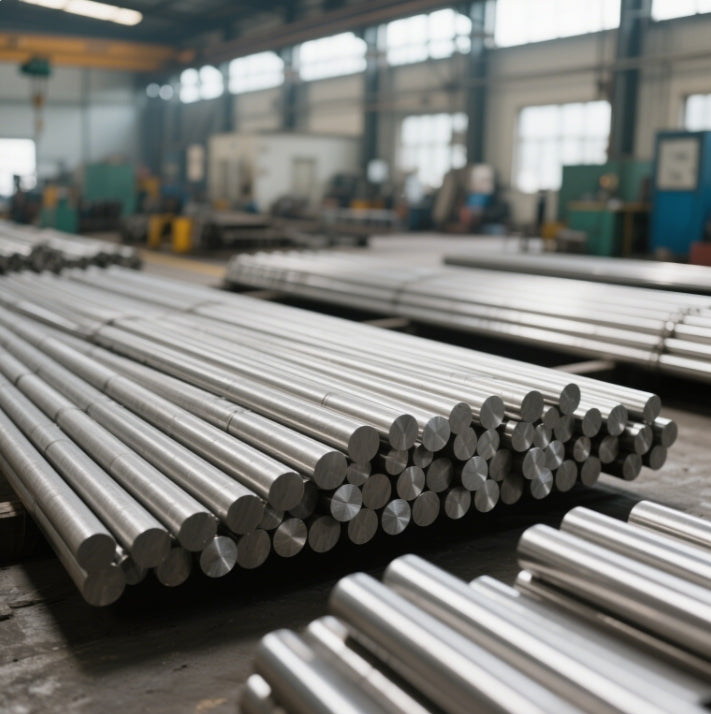StockSteel
Stainless Steel Rod Experts | ANSI/AISI Compliance
Stainless Steel Rod Experts | ANSI/AISI Compliance
Couldn't load pickup availability
Stainless Steel Rod Experts | ANSI/AISI Compliance
Product Specifications
| Parameter | Details |
|---|---|
| Material Grades | 316L, 304, 2205 Duplex, 17-4 PH (Customizable for stainless steel guide rod or stainless steel curved shower rod) |
| Diameter Range | Round Rods: 3–500mm; Threaded Rods: M6–M30; stainless steel rod 1/4 (6.35mm diameter) |
| Length | 0.1–12m (Standard), Custom Lengths Available (±0.1mm Tolerance) |
| Hardness (HV) | 150–250 HV (316L); 300–400 HV (Cold-Worked/Duplex Grades) |
| Tensile Strength | 520–860 MPa (316L); 800–1,200 MPa (Duplex 2205); 700–1,000 MPa (17-4 PH) |
| Surface Finish | Polished (#4–#8 Mirror), Passivated, Cold Drawn, Electroplated (Optional) |
| Machining Tolerance | ±0.01mm (CNC Precision), ±0.05mm (Standard) |
| Certifications | ISO 9001, ASTM A276, EN 10088, NACE MR0175 (H₂S Resistance) |
Mechanical & Chemical Properties
Tensile Strength
Our stainless steel rod 1/4 (6.35mm diameter) achieves tensile strengths of 860 MPa (316L grade), ideal for applications requiring corrosion resistance in marine or high-humidity environments like stainless steel curved shower rod installations. The 316L alloy, enriched with 2–3% molybdenum, resists chloride-induced pitting in coastal areas, while duplex 2205 rods combine austenitic-ferritic microstructures to deliver 1,200 MPa tensile strength for industrial machinery. Precipitation-hardened 17-4 PH rods (700–1,000 MPa) are heat-treatable for aerospace components requiring dimensional stability.
Bend Strength
Bend strength ranges from 60–75% of tensile strength, optimized for dynamic loads. For stainless steel guide rod systems, cold-drawn 316L rods exhibit 30% higher bend resistance than annealed grades, critical for precision machinery. The stainless steel curved shower rod (304 grade) maintains bend resistance of 310–430 MPa, resisting deformation under thermal cycling in humid bathrooms.
Identification & Marking
Stainless steel rods are labeled per global standards:
- ASTM A276: Specifies chemical compositions (e.g., 316L: 16–18% Cr, 10–14% Ni, 2–3% Mo).
- ISO 15510: Ensures traceability for medical and marine applications.
- Laser Etching: Permanent markings include grade (e.g., "316L-860MPa"), batch number, and tensile class.
Weight Calculation
Weight (kg) = Volume (m³) × Density (7,930 kg/m³ for austenitic steel).
Example for a 10mm diameter, 1m rod:π × (0.005m)² × 1m × 7,930 kg/m³ ≈ 0.62 kg.
For stainless steel rod 1/4 (6.35mm diameter):Weight ≈ 0.25 kg/m. Custom weights vary based on alloy density and surface treatments.
Why Stainless Steel Rusts: Causes & Solutions
While stainless steel resists corrosion via a chromium oxide layer (≥10.5% Cr), specific conditions trigger rust:
- Chloride Exposure: Saltwater or cleaning agents degrade passive layers. Use 316L for stainless steel curved shower rod applications in coastal areas.
- Galvanic Corrosion: Contact with carbon steel accelerates oxidation. Insulate metals using nylon spacers or dielectric coatings.
- Mechanical Damage: Scratches expose iron. Passivate surfaces with nitric acid post-machining to restore chromium oxide layers.
- Low Oxygen Environments: Stagnant water in crevices (e.g., threaded joints) breeds crevice corrosion. Design gaps >0.5mm for oxygen flow.
Why Choose Our Stainless Steel Rods
- Certified Quality: ISO 9001 and ASTM-compliant production with third-party SGS/BV inspections.
- Precision Customization: Tailor stainless steel guide rod, curved shower rod, or threaded rods to exact dimensions (±0.1mm tolerance).
- Fast Delivery: 15–30-day lead time via DHL/FedEx global logistics.
- Sustainability: 100% recyclable alloys; lean duplex grades reduce nickel consumption by 50%.
- Technical Support: Expert guidance on welding parameters (e.g., ER316L preheat: 150–200°C) and corrosion prevention.

